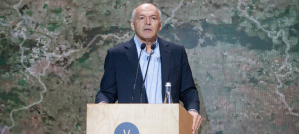Summaries of Defeat or Win Scenarios for 2030 prepared by experts for the 20th YES Annual Meeting
Losing the Long Game
By Liana Fix, a fellow for Europe at the Council on Foreign Relations (CFR)
With the upcoming U.S. elections in November, Ukraine and its partners fear a worst-case scenario in which a re-election of Donald Trump could abruptly end U.S. military and financial support for Ukraine, leading to a resounding defeat on the battlefield. However, a dramatic event, like the re-election of Donald Trump, is not necessarily the only scenario for defeat.
Even under the best of circumstances, Vladimir Putin eventually can win the long game in Ukraine if Western countries lose focus. In the scenario, Ukraine neither not soundly defeats Russia and liberates its territory, nor gets NATO membership or similarly iron-clad security guarantees. In this situation, an agglomeration of conflicts and a return of global threats, such as terrorism, or a weakening of support for Ukraine in an important EU country, can be enough of a distraction (both of which an undefeated Russia will actively support). In this scenario, the global consequences of a Ukrainian defeat might not be visible immediately, but they would unfold over time, especially with regard to China’s hegemonic ambitions in the region.
In the decades to come, few historians would not reference Russia’s war against Ukraine explicitly or implicitly as having shaped the trajectory of geopolitics around the globe into a more adversarial - and a more dangerous - direction. Also, in such a scenario NATO-Russia war in less than 10 years seems a very realistic possibility.
2030: The Russia-Ukraine War Has Become Less Intense – and the Globe Has Become More Unstable
By Happymon Jacob, Professor, Jawaharlal Hehru University
This scenario set in 2030 is predicated on the assumption that the Ukraine-Russia war has not come to a complete end. The two sides are mired in a low-intensity but recurring conflict with restive border regions, and occasional, limited skirmishes. Third parties have managed to get the two sides to agree to a series of war management measures even though a complete end to the war is nowhere in sight.
Western support for Ukraine continues but has dwindled as the U.S. shifts focus to its strategic rivalry with China, and far-right parties gain ground in some EU countries. Ukrainian citizens, weary after eight years of war, became more open to imperfect stability. The US seeks to draw Russia away from China, and Europe sees a “managed” Russian-Ukrainian conflict as less risky than an all-out war. Meanwhile, a weakened Putin, who has been unable to achieve Moscow’s strategic goals in Ukraine faces mounting economic pressure to ease sanctions and growing internal pressure to end the war.
This scenario would mean weakened international law and institutional mechanisms and more minilaterals among like-minded coalitions. This would also mean greater emphasis on self-reliance for security which in turn could result in increased militarization and potential nuclear proliferation, while global coordination on issues like climate change and migration becomes increasingly challenging.
In 2030, the Russia-Ukraine war has become less intense – and the globe has become more unstable.
Ukraine 2030. The Invention of European Security
By Marie Mendras, Researcher, CNRS, Professor at Sciences Po
In this scenario, in 2030 Ukraine will be at a promising juncture. The country received from Europe and the US the needed amount of weapons to defeat Russia. Russia’s total surrender was the only acceptable outcome and way to peace. In 2030, Ukraine is is engaged in the second phase of post-war reconstruction, and in the process of overcoming the tremendous injuries inflicted on everyone. Ukrainians are adjusting to their new status of European Union member-state, and maybe NATO member as well.
Relations with the post-war transition government of Russia are monitored by an international agency that will also supervise Russia's political and social reconstruction. Kyiv takes part in this multilateral venture to devise and organize new institutions, law and order in the future confederal state of Russia.
The EU has found a concise joint policy and overcome internal contradictions, after member states with pro-Russian stances have failed to gain any influence. The UN Security Council has been reformed and the new state of Russia is one of the members of this enlarged body, putting an end to the veto of the P5.
In 2030, Europe is stronger, politically and economically, better organized, and more united, as the terrible in Ukraine war has taught us lessons.
2030: Ukraine's Victory in the War – What Does It Mean?
By Tymofiy Mylovanov, President of Kyiv School of Economics, and Andrii Zahorodniuk, Chairman for the Centre for Defence Strategies
In this scenario, by 2030 Ukraine has not only defeated Russia and liberated its territory but also gained NATO membership and robust security guarantees.
This situation leads to a cascade of positive developments, including strengthened international law, improved global stability, and significant economic growth for Ukraine and the surrounding region. The defeat of Russian aggression reinforces the rules-based international order and deters future acts of aggression by other potential bad actors.
In this scenario, the global consequences of Ukraine's victory unfold over time. The world would witness a reinforcement of international law, a revitalization of Western strategic culture, and a transformation of the global economy.
In the decades to come, historians would likely reference Russia's war against Ukraine and its outcome as a pivotal moment that shaped the trajectory of global politics towards a more cooperative, stable, and prosperous direction. Additionally, in such a scenario, the likelihood of major conflicts between great powers would significantly decrease, as the international community demonstrates its ability to unite against aggression and uphold the principles of sovereignty and territorial integrity.
←Повернутися до списку

